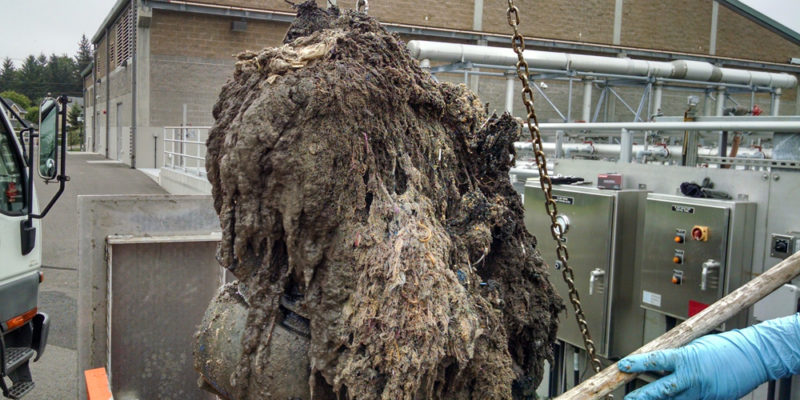
Today, Congresswoman Lisa McClain (R-MI) and Congressman Alan
Lowenthal (D-CA) introduced the Protecting Infrastructure and Promoting Environmental
Stewardship (PIPES) Act, which would require the U.S. Environmental Protection Agency to
establish standards for the flushability of disposable wipes and would impose civil penalties on
companies who are knowingly incompliant with these standards.
“The PIPES Act would help clear years’ worth of damage to our sewage systems made by wipes
that have caused massive clogs that can’t be easily removed,” said Rep. Lisa McClain. “Thank
you to Congressman Lowenthal, the American Public Works Association, the National
Association of Clean Water Agencies (NACWA), the California Association of Sanitation
Agencies (CASA), the National Rural Water Association, Macomb County Public Works, the
Charleston Water System, the Michigan Municipal League, American Rivers, the National
Onsite Wastewater Recycling Association, Ocean Conservancy and the National Association of
Water Companies for their support of this crucial piece of legislation.”
“The problem of flushed wet wipes has created tremendous problems for our water infrastructure
for many years and is just one facet of our growing plastics waste pollution crisis,”
Congressman Lowenthal said. “The PIPES Act would provide consumers with a flushability
standard and the information they need to properly dispose of these wipes, and in doing so
protect our water infrastructure and our environment.”
“This is extremely important legislation to help us all protect our critical underground
infrastructure. Packaging on all wipes should clearly say “Do Not Flush.” They may be flushable
but they are not biodegradable and these wipes are wreaking havoc on our sewers,” Macomb
County Public Works Commissioner Candice S. Miller said.
“NACWA applauds Representatives Lisa McClain (MI-10) and Alan Lowenthal (CA-47) for
introducing the Protecting Infrastructure and Promoting Environmental Stewardship Act (PIPES
Act). If enacted, the bill would require the U.S. Environmental Protection Agency to establish
standards for the flushability of disposable nonwoven products – commonly known as wet wipes.
The bill would ensure that these products, when marketed as “flushable” or “sewer and septic
safe”, do in fact travel through and break down in wastewater systems without causing harm to
plumbing, sewers, or the environment,” CEO of the National Association of Clean Water
Agencies Adam Krantz said. “For far too long, clean water agencies and their workers have
dealt with the clogs, strained and damaged equipment, and extra costs and dangers associated
with wipes that are flushed but do not break down as advertised. And clean water utility
ratepayers have paid the literal price for these mislabeled products through higher rates to
address the sewer system damage they cause. Many wipes on the market today that are labeled as
“flushable” are prone to getting stuck in plumbing, forming clogs in sewer lines, and causing
mechanical failures for utilities. Yet consumers are misled to believe that they are appropriate for
disposal down the toilet. This commonsense bill would allow shoppers to make informed choices
and would protect property owners, public utilities, ratepayers and the environment. NACWA
looks forward to working with Congress to advance this timely legislation to protect clean water
infrastructure.”
“On behalf of the American Public Works Association (APWA), I thank Representatives
McClain and Lowenthal for introducing this important, bipartisan legislation. Disposable
nonwoven products can cause significant damage to the critical water infrastructure our members
operate and maintain, and directing EPA to establish clear, enforceable standards for flushability
will reduce the costs imposed on our communities,” said APWA CEO Scott D. Grayson, CAE.
“CASA applauds Representatives Lisa McClain and Alan Lowenthal for introducing the PIPES
Act,” Executive Director of the California Association of Sanitation Agencies Adam Link
said. “This bipartisan legislation addresses a problem that has plagued local clean water agencies’
efforts to effectively manage collection systems and improve water quality for years. By
codifying the International Water Services Flushability Group’s code of practice, the PIPES Act
will ensure that wet wipes marketed as “flushable” are truly flushable. This bipartisan legislation
will ensure truthful marketing practices while protecting the nation’s clean water infrastructure
and public health.”
“I commend Congresswoman McClain for introducing this legislation – which is both necessary
and appropriate to protect public sewer systems from costly repairs, unnecessary maintenance,
and sewer overflows caused by non-flushable wipes. Kimberly-Clark recently demonstrated
industry leadership and environmental responsibility when it agreed to meet the substantive
performance standards and labeling requirements in this legislation by May 1, 2022. It is time to
force the rest of the wipes manufacturers and retailers – who have been dragging their feet – to
meet the same environmental standards. I urge Congresswoman McClain’s colleagues to pass
this legislation expeditiously”, said Paul Calamita, a national municipal attorney who also is
leading the Charleston Water System’s class action lawsuit against manufacturers and
retailers of flushable wipes.
“Flushed wipes are wreaking havoc on our nation’s wastewater facilities. Once flushed, rather
than dissolving, nonwoven wipes end up as clogs that can weigh hundreds of pounds, blocking
sewer pumps and pipes, jeopardizing worker safety, and costing utilities millions of dollars
annually. NRWA fully supports Congresswoman McClain’s legislation which would
dramatically reduce the negative consequences of improper labeling and disposal,” said CEO of
National Rural Water Association Matt Holmes.